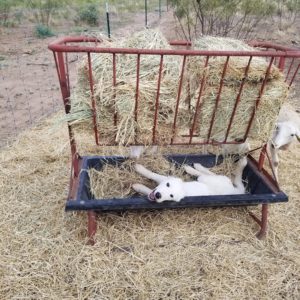Update: October 4, 2019
October tends to be a slow month for most LGDs. But it may be the best month to do a little “housekeeping” and get ready for some challenging months to come. Check out our timely tips at the end of this blog.
On September 17 Scott Anderson, Texas A&M AgriLife Extension agent in Brown County, held a workshop on predator control in Brownwood. He had over 60 people attend the event and had a great set of guest speakers. I presented on “Improving the Effectiveness of Livestock Guardian Dogs” which covered a variety of information from selecting a LGD to proper bonding techniques and feeding strategies. The crowd was very receptive and asked many questions during and after the presentation. I would highly recommend attending the next workshop that Scott puts on.
The six puppies in the bonding project are all doing well and growing rapidly. The Maremma pups are now 15 weeks old and the Akbash cross pups are 11 weeks old. They all have different individual personalities, but similarities exist based on the breeding and rearing environment of the breeder we sourced the dogs from. In general, the Maremma pups are a little more timid, while the Akbash cross pups are a little more adventurous. This could be “nature” or “nurture.” The Akbash pups received more human contact while they were with their mother than the Maremma puppies did. It will be interesting to see which set of pups end up bonding more to livestock when they are mature. All the pups are leading well on a leash and just lay down when tethered now. Thor and Hulk really enjoy riding in the truck.
As you can see in the picture below of “Moe,” it’s a tough life guarding some of our stock. He had just woken up and is yawning in the picture. After this picture he went back to sleep!
If your dog’s look to be in poor condition, don’t hesitate to confine them to a smaller area for some rest and improve the dog’s diet. If you can easily feel the dog’s ribs, vertebrate or hip bones, your LGD needs to gain weight and rest. Provide them with plenty of high-quality food until they reach approximately a 5 canine body condition score. You may need to isolate them in a pen away from other dogs with some livestock to allow them to recuperate. It may take 4-6 weeks for the dogs to gain enough weight back to return to full strength.
We are holding a Fall Livestock Guardian Dog Field Day in Knox County in the city of Munday on October 25. The city of Munday is a little over 2 hours North of San Angelo. To register for the event contact Jerry Coplen at the Knox County AgriLife Extension Office at 940-459-2651. Cost is $25 or $40 per couple if registered by October 18. Topics will include GPS Tracking, Dog Health and Parasites, LGD Feeding Systems, Legal Issues with LGDs, Wildlife Services, a producer panel and a ranch visit. Dog breeders and exhibits will also be on site at the Munday Event Center the day of the event. We hope to see you there!
LGD Timely Tips:
- In the fall, a LGD’s appetite should return to full strength and they will start to regain weight lost in the summer from warding off predator and beating the heat. Be sure they have access to the right dog food for their lifestyle, age, and condition.
- Breeding season may bring about new animals to the flock. Be mindful of LGDs when you introduce breeding rams and billies to the ewe flock or doe herd. Some LGDs will see them as a threat.
- Hunting season is just around the corner. Now is the time to talk with your deer hunters about your LGDs, especially if you have any new hunters or new LGDs. A simple conversation about how to deal with potential conflict might be the difference between a simple solution and a major problem. Remind hunters that LGDs are not pets and that they should be treated as a working dog.
To provide feedback on this article or request topics for future articles, please contact me at bill.costanzo@ag.tamu.edu or 325-657-7311.
Bill Costanzo
Research Specialist II, Livestock Guardian Dogs
Follow us on Facebook: https://www.facebook.com/TAMUlivestockguarddog/


